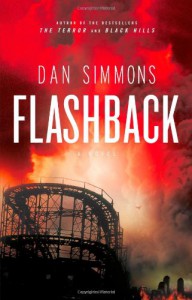Arbie's Unoriginally Titled Book Blog
It's a blog! Mainly of book reviews.
Currently reading
Flashback, Dan Simmons

I'm not entirely sure what to make of this book. It's a lot of things; near-future dystopia, murder mystery, violent political thriller, tale of addiction and recovery and (partial) redemption. On most of these fronts it succeeds admirably. It starts slowly but builds up to become a gripping tale that kept me up half the night, desperate to find out what was going on. All the clues are there but the whole thing is baffling until the Agatha Christie style revelation (yes, revelation, not "reveal", ugh!) which is just what I want. I hate to be able to guess correctly in advance. Along the way there are several tense and/or exciting set-pieces. As usual with Simmons, the characters are well drawn, flawed and believable. But all of the above is avoiding what has proved to be the highly controversial element of the story; the dystopia.
The near-future world of Flashback is one where the geo-political landscape is unrecognisable: The USA has gone bankrupt, along with the Russian Federation, China and Western Europe. An Islamic Caliphate has taken over the Russian, Middle Eastern and Western European territory, destroying Israel along the way. India and Japan have invaded a collapsed China that fights with itself as much as it's neighbours. Japan has effectively taken over the USA through economic dominance. And all because - Obama couldn't pay for his welfare reforms!
All near-future SF eventually turns into alternative history SF as the present reality catches up with the speculative future of the fiction. In many cases this doesn't seem to have any negative impact on the story: 1984 is just as powerful and important now as it was in 1948. The interesting aspects of 2001 are not weakened by the fact that we aren't really doing crewed space-flight beyond the asteroid belt yet. So one could argue that since the USA and hence it's inextricably linked trading and debt holding partners haven't gone bankrupt on the schedule of Flashback, no real ham has been done. It could yet happen...but that isn't the problem for me, or the only problem. The first (and relatively minor) problem is that just as plausible a case for the USA going bankrupt can be made if you speculate that the USA continues/re-starts an aggressive neo-Imperialist/Colonial warmongering policy, which under Dubbya could only be funded by borrowing with no sign of compensatory economic growth on that road either.
The second, much more serious problem is that, no matter how one theorises a future-history leading to "global economic melt-down", next to nothing that Simmons concludes would result from it strikes me as anything but completely preposterous. The crucial Global Caliphate and resurgent Japan both seem extra-ordinarily unlikely, just for starters. These led me to struggle with my "suspension of disbelief" in a way I have never done with a Simmons novel before - novels that include such things as vampires, spirit-bears, telepathy, ghosts, monsters and space-faring trees.
Many people take Flashback's right-wing hawkish politics as representing Simmon's political position. Simmons himself denies that it does. Having read the book with this in mind, I note that the author goes to some lengths to put the political statements in the mouths of characters, often ones reporting the statements of their acquaintances, rather than putting them in as wodges of omniscient narrator exposition. This makes Simmons' protestations much stronger in my mind. It's much harder to divorce an omniscient narrator from the author than the views of the author's characters from those of the author. But it still makes one wonder why he did it. Part of the answer seems simply to be he wanted to write a dystopia. Dystopias usually fairly overtly carry a Stark Warning about something. In 1984 it's Totalitarianism and surveillence (among other things), for instance. So the question is (if we are to believe Simmons) what is his Stark Warning, if it is not, "Obama will destroy the world by bringing socialism to the USA"?
I think the answer is, humanity is becoming, soft, decadent and divorced from the struggles that make it vital. As incidental evidence I raise Simmons' Ilium-Olympos sequence, where humanity has become so dependent on technology that it, en mass, does not understand, that it has forgotten how to read, cook, or in fact do any of the basic necessities of survival. In Flashback, Simmons, to me, is saying, we have become so soft that we cannot cope with pain; any kind of pain, physical or emotional and further, we rely entirely on government and pharmaceuticals to prevent or assuage all causes or manifestations of pain or even discomfort.
I don't think that can be laid solely at Obama's door...











 7
7
 7
7